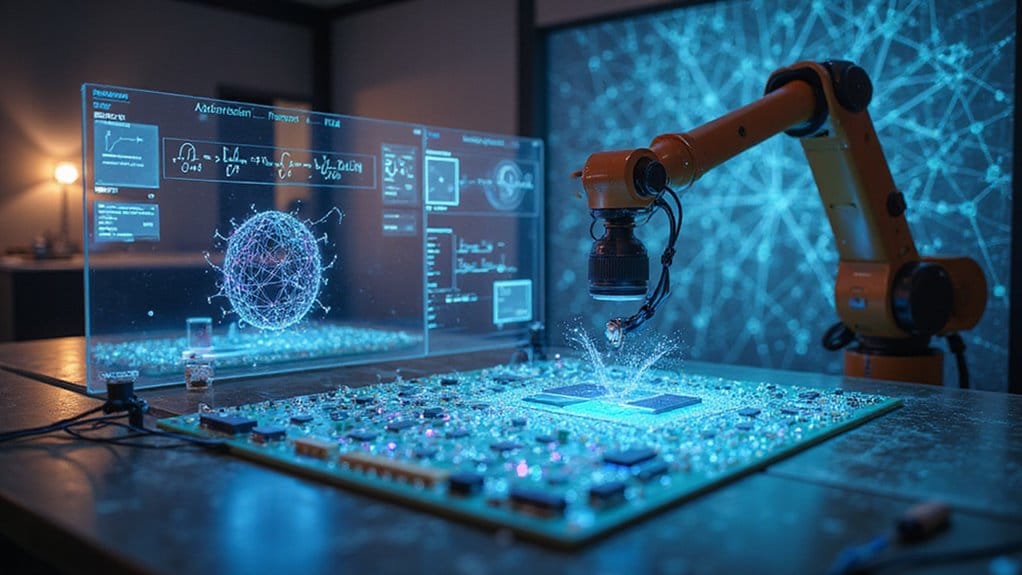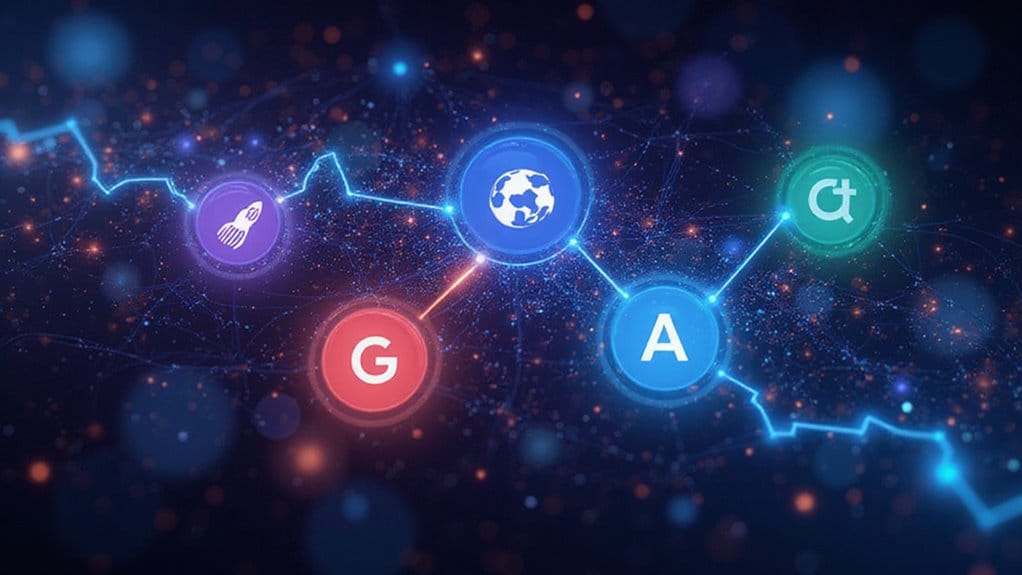Future AI careers? Get ready! You’ll need a solid grasp of programming languages like Python and Java, and don’t forget tools like TensorFlow. Handling big data is daily business, so knowledge of Hadoop is your friend. Plus, soft skills matter—creative problem-solving and emotional intelligence can set you apart. Adapt quickly or get left behind! Continuous learning? Absolutely essential. Stay updated on trends! Curious about what else it takes to thrive in this exciting field? Stick around!

What does the future hold for careers in artificial intelligence? Brace yourselves, because the landscape is changing rapidly, and if you’re not ready, you might just get left behind. With AI innovations exploding in every sector, the career opportunities are vast and thrilling.
But, before you plunge in, let’s talk about the skills you’ll need to ride this wave.
First, programming languages like Python, R, and Java are your best friends. Master them. Why? Because they have the extensive libraries and frameworks that are crucial for AI applications.
Master programming languages like Python, R, and Java—they’re essential for harnessing the power of AI applications.
Next up, familiarize yourself with machine learning and deep learning tools like TensorFlow and NumPy. You want to create the next groundbreaking AI model? Knowledge here is non-negotiable.
Now, let’s get serious about data management. Handling large datasets is a daily reality in AI, so tools like Hadoop and Apache Spark should be on your radar. You’ll also want to develop a solid grasp of statistical analysis; think of it as your secret weapon for making sense of the numbers. Continuous education is essential for engineering professionals to keep pace with these demands. Moreover, machine learning and deep learning skills are critical as they encompass the core methods that AI systems rely on for performance. The demand for AI and machine learning engineers is skyrocketing as industries increasingly integrate these technologies into their operations.
Don’t forget to flex those creative muscles! AI isn’t just about crunching data; it’s about innovative problem-solving. So, cultivate your adaptability and critical thinking skills.
You’ll also need emotional intelligence because, let’s face it, collaborating with diverse teams is key in this field.
And speaking of collaboration, effective communication is essential. You must be able to explain complex AI findings in simple terms. If your teammates don’t understand what you’re saying, good luck implementing any of those brilliant ideas.
Lastly, stay committed to continuous learning. The AI field is evolving at lightning speed, and keeping up is not optional. Take that online course, attend workshops, and network like your career depends on it—because it does.
Prepare today, and you’ll be ready for the incredible career opportunities tomorrow holds in artificial intelligence. Don’t get left in the dust!
Frequently Asked Questions
What Industries Will Be Most Impacted by AI Careers?
Industries like healthcare and manufacturing are set for a major shake-up, folks.
Get ready for healthcare advancements that promise to personalize treatments—yes, please!
Meanwhile, manufacturing automation is here to take over repetitive tasks, boosting efficiency.
If you’re not paying attention, you might find yourself left behind.
Embrace this change! Immerse yourself in AI training now, or risk becoming obsolete in a job market that’s evolving faster than a cat video goes viral.
How Can I Transition Into an AI Career From a Different Field?
Shifting into AI from another field requires a solid career mapping strategy.
First, identify your skill gap; what do you need to learn? Brush up on programming languages like Python, and immerse yourself in machine learning basics.
Build a portfolio with personal projects—trust us, employers love that!
Network relentlessly; attend meetups and engage on forums.
Adapt to the ever-changing tech landscape, or risk being left behind in the dust.
Don’t just watch AI—become part of it!
What Certifications Are Recommended for Aspiring AI Professionals?
Aspiring AI professionals should seriously consider several AI certifications.
Start with the Certified Artificial Intelligence Engineer (CAIE) if you crave technical skills.
Don’t ignore online courses like IBM’s AI Engineering Professional Certificate for practical know-how!
Want to consult? Go for the Certified Artificial Intelligence Consultant (CAIC™).
Choose wisely—these certifications are your ticket to standing out in a booming job market.
Miss out, and you might just blend into the crowd!
Will AI Jobs Require Advanced Degrees or Can I Self-Learn?
AI jobs can be snagged without an advanced degree—yes, really! Self-learn through online courses and tackle skill assessments to prove your worth.
Immerse yourself in programming, data analysis, and machine learning. Don’t just sit there; get involved! Certifications can boost your resume, but practical experience matters too.
Are There Remote Work Opportunities in AI Careers?
Absolutely, there are remote work opportunities in AI careers! Many companies embrace remote collaboration, letting you work from anywhere—yes, even your couch.
Enjoy flexible schedules that suit your lifestyle; no more 9-to-5 grind! Roles like Machine Learning Engineer and Generative AI Engineer are in demand.









